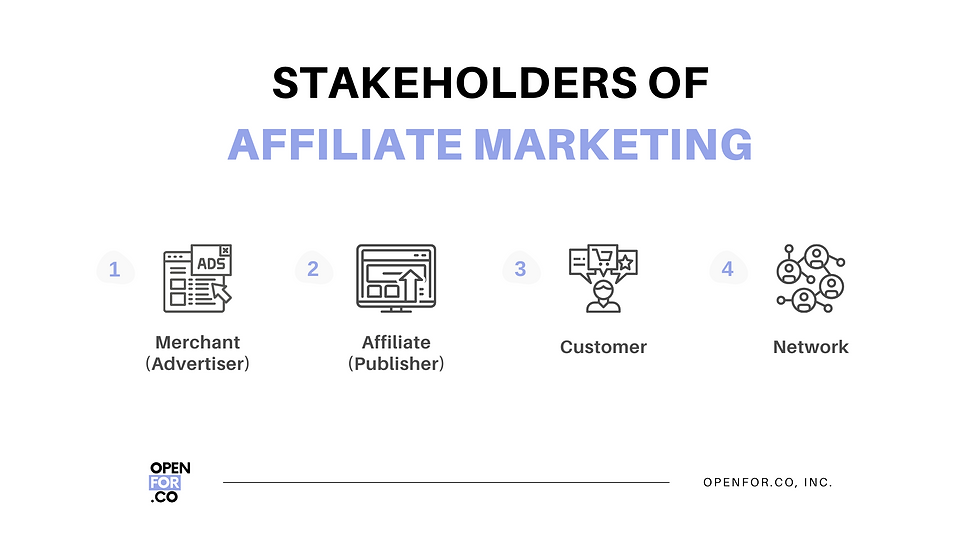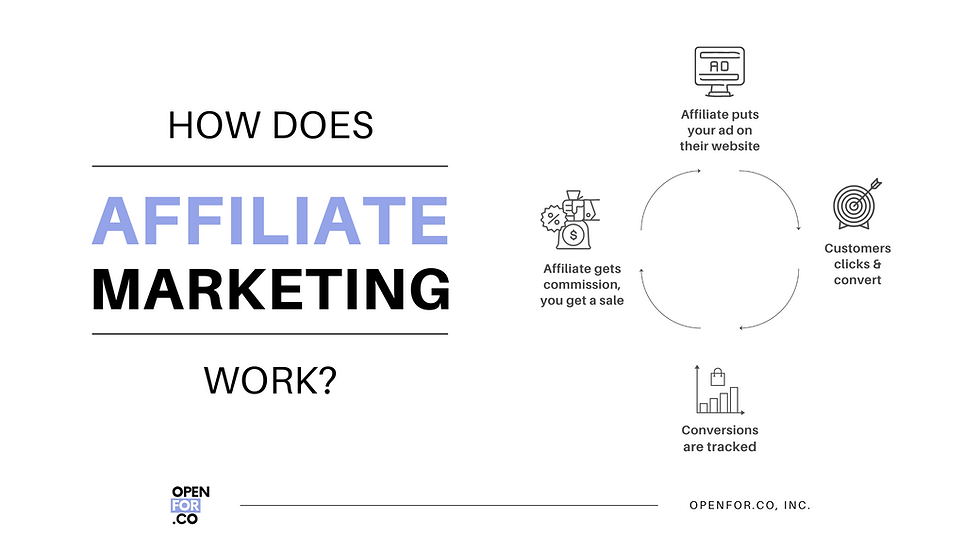Everything You Need To Know About Affiliate Marketing For Your Business
- Erdinc Ekinci

- Dec 16, 2021
- 6 min read
Updated: Mar 22, 2022

Oftentimes, when most people think of marketing your brand online, the first things that come to mind are through ads and increasing reach on social media. Many startups and businesses continue to tend to tirelessly put their efforts into creating the perfect social media posts that will increase engagement or find the perfect keywords for their websites to increase online traffic.
While these methods can help you promote your products or services, it may often take a long time until your goal is reached. Even though these methods are all important aspects of Digital Marketing, there is an alternative that might help to ease your marketing hassles.
Affiliate Marketing, which is about offering promoters a financial incentive every time they successfully sell your product or service, can be a valuable asset when added to your Digital Marketing toolkit.
Affiliate Marketing is easy to get started, low cost, and just might be the tool to help get you the attention that your product deserves. This article will cover what exactly is Affiliate Marketing, the different stakeholders involved, its importance, benefits, risks, and tips for Affiliate Marketing successfully.
We will cover the following topic in this article
What is Affiliate marketing?
The Stakeholders of Affiliate Marketing
How Does Affiliate Marketing Work?
Benefits of using Affiliate Marketing as Business Owner
Risk of using Affiliate Marketing as Business Owner
Please also check out the article “How to Get Started Affiliate Program Step by Step” for more details.
1. What is Affiliate Marketing?

According to Neil Patel, “Affiliate marketing is the process of earning money [commissions] every time you promote a company’s products or services and drive a sale. Similar to a commission-only sales representative, you only get paid every time you drive a sale.”
Hence, Affiliate Marketers can earn money every time they successfully sell a product and at the same time, the product creator will have more sales up their sleeves. Affiliate marketing is about making referrals of products or services of companies and receiving commission or on the product creator side, it is about finding the right affiliates in the network to market your products.
2. The Stakeholders of Affiliate Marketing

Just like with most concepts in Business and Marketing, there are also different parties involved in Affiliate Marketing. Typically, there are four stakeholders in the world of Affiliate Marketing namely the Merchant, the Affiliate, the Customer, and the Network.
Even though it all comes down to the Merchant and the Affiliate, it is a good idea to understand all stakeholders to get a better understanding of how Affiliate Marketing works as a whole.
2.1.The Merchant (Advertiser)
The Merchant is the creator of the product. It can either be a big company like Amazon or individual entrepreneurs.
2.2.The Affiliate (Publisher)
Also known as the publisher, the Affiliate plays an important role in this type of marketing. Similar to the Merchant, they can range from single individuals to big companies and commissions can range from a few hundred dollars each month or millions.
The Affiliate tries to attract and convince customers to actually end up buying or signing up for the service while getting commission for every sale they make. They do this by setting up sign-up links on their blogs, social media platforms, or sharing their coupon codes where people can use them to buy products.
2.3.The Customer
Of course, an affiliate market system won’t work without the customers. If customers buy through the link or source that the affiliate provided, cookies or the tracking system will lead back to the affiliate and the affiliate will get commissioned.
2.4.The Network
An affiliate network works as the media between the affiliate and the merchant where they can find each other. Sometimes, new affiliates have to sign up through Affiliate Networks set up by merchants to get started with their marketing. Some examples include Clickbank and Amazon Associates.
Overall, affiliate marketing plays a vital role in promoting one's brand. A collaboration between Merchants and Affiliates can really boost up your engagements of a certain product to wider sets of markets depending on the platforms the marketers are using. Not only that, but by doing so it could really increase profit and sales of the products.
3. How Does Affiliate Marketing Work?

Affiliates put merchants' advertisements on their website and social meida. Whenever the customer is clicked or converted as target activities such as sales, those conversations are tracked and affiliates get paid from Merchants. The payment terms can be one of them.
When creating a partner program, you will need to specify payment terms to offer to your publishers. It can be either of the followings
CPC (cost per click)
CPM (cost-per-mile)
CPA (Cost per acquisition)
For CPC, The drawback is a probability of fake click and the CPM drawback is it does not guarantee for real conversion rate because it is for how many interactions and reach.
Most Merchants prefer CPA because it is paid for particular actions such as sale, lead, install, or registration, etc. The drawback of the CPA commission is that it is more expensive than CPC and CPA.
4. Benefits of Using Affiliate Marketing for Businesses
Now that we’ve covered all the basics about Affiliate Marketing, let’s dig into some of the benefits of this type of marketing from the perspective of Merchants. Among the many benefits, ultimately it all comes down to about five main benefits.
4.1.Performance-based
Affiliate Marketing is performance-based, meaning that you only pay when a sale is made. This means that it is a low-risk form of marketing as it won’t hurt your budget if the affiliate fails to make an effective campaign or fails to sell your product. This will also help encourage your affiliate to work better and more creatively in order to sell your product.
4.2. Expanding markets and hand-picking your partners
As Affiliates can be found in every type of market and product category, you will get to pick who you want to work with. This way, you’ll broaden your connections and even have the opportunity to expand into new markets as there are affiliates in many types of markets. As the popularity of this type of marketing is increasing, there is also a large pool of affiliate marketers you can choose from that fits your specific business needs.
4.3.Boosting brand reputation
As most viewers trust the content creator they are consuming from, working with affiliates will help establish quicker and more convenient sales. Further, if more sales are made through these affiliates, your brand will get more recognition.
4.4.Cost-effective
Affiliate Marketing is extremely cost-effective. As you are only paying when you have your desired outcome, you do not have to worry about losing money to an ad campaign or something similar. As you are only paying when you’ve received solid proof, there is low risk as well.
4.5.Targeted Traffic and Increased SEO
As you will be working with affiliates of your choice, you will be able to choose ones that are focused on your target audience and customers. For instance, if you have a beauty product you want to sell, you would not want to waste your time advertising to people who are looking to buy books. You can avoid this by choosing affiliates who are working in the beauty industry or are beauty bloggers/ YouTubers. Further, as affiliates are sharing details about your product or brand, they help drive up your SEO as more people search for your products or navigate through your pages.
5. Risks of Affiliate Marketing as the Business
Like with most things, there are risks and disadvantages to Affiliate Marketing too. Granted, there are more disadvantages on the affiliate side of things than there are on the merchant. For the merchant, disadvantages can stem from:
5.1.Affiliates who do not create value
When a company has too many affiliates, it can often get mixed up who are the ones actually driving up your sales and who are the ones benefiting from the efforts of others. To prevent this, it is important to dig into each affiliate, their tactics, and their platform before agreeing to work with them.
5.2.Unethical Affiliates
Although most affiliates tend to add significant value to the companies, there are a few who have marketed products without the merchant’s consent. This can be avoided through careful screening of applicants.
5.3.Misaligned incentives
In the Affiliate Marketing industry, networks have represented both affiliates and merchants in a single transaction and charge a performance fee to do so. This leaves no room for proper checks and balances. If not properly checked and balanced, incentives can be perpetually misaligned. This may lead to a more serious problem including fraud, trademark bidding, and cookie stuffing.
6. Conclusion
When thinking about Digital Marketing, it is important to not leave out Affiliate Marketing. It is a billion-dollar business and something that’s increasing in popularity among businesses. Successfully marketing your products and services is not easy but perhaps, adding affiliate marketing to your toolkit might just help you to reach your goals faster. After you know what affiliate marketing is overall, it is time to start to launch your own affiliate program. Here is “How to Get Started Affiliate Program Step by Step”


Comments